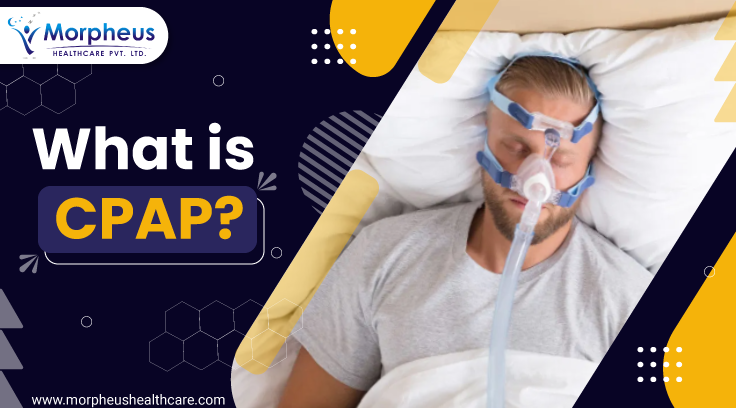What is CPAP?
Apr 29, 22

Continuous Positive Airway Pressure machine or CPAP machine, as it is commonly known, is considered the most popular and widely accepted treatment option for Obstructive Sleep Apnea.
Those affected by Obstructive Sleep Apnea experience a complete or partial collapse of upper airway during their sleep. This collapse or obstruction in the airway causes them to stop breathing for a few seconds at a time, repeatedly throughout the night. Such obstructions can lead to a number of health concerns including heart disease, stroke, diabetes and other chronic conditions.
Because of the possible consequences of OSA, it is of utmost importance to treat and correct this problem of airway obstruction immediately upon diagnosis. And it is the CPAP machine which does the work of eliminating these obstructions and keeping the airway open during sleep.
What are the different types of CPAP Machines?
The two types of CPAP machines are Manual CPAP and Auto CPAP. A Manual CPAP is one, where the air pressure is manually set at a constant setting and doesn’t respond or change as per user’s needs. This is typically an entry level CPAP type and is not very popular due to its technical constraints.
The second CPAP type is the Auto CPAP wherein the air pressure can vary through the night depending on the user’s condition. The Auto CPAP machine automatically responds to user’s varying pressure needs and ensures a comfortable, obstruction free sleep. Most leading brands and models of CPAP machines are of the Automatic variant, since it is the most popular type of CPAP globally.
How does a CPAP Work?
The CPAP machine works on the principle of providing continuous air pressure to the upper airway passage, during a person’s sleep. This continuous positive pressure prevents upper airway from collapsing, thereby eliminating any instances of obstruction and cessation of breath. The air pressure delivered to the user can be either fixed at a constant setting, or vary in response to the user’s physiological requirements.
The three main components of any CPAP therapy are the –
- CPAP Machine Main Unit
- CPAP Flexible Tube
- Mask
CPAP Machine Main Unit: Typically, a CPAP machine comprises of a pump or motor, which takes in room air and pressurises it for delivery to airways. The air inlet part of the machine has a replaceable filter which removes any particulates and impurities before it reaches the user.
CPAP Tube: The main machine unit is connected to a flexible tube or hose pipe which transports the pressured air from the machine to the user.
Mask: The other end of the CPAP tube is connected to a mask, which is what comes in direct contact with the user. It is the mask which then delivers the desired air pressure to the airways through the user’s nose or nose and mouth. CPAP masks come in various shapes and sizes designed to suit different face types. The 3 main types of masks are nasal masks, nasal pillow masks and full face masks.
In addition to the above components, more advanced variants of the CPAP machine also come with an added attachment called the Humidifier, which provides sufficient humidification and moisture to the user during their therapy. This is a recommended attachment for enhanced therapy comfort and superior experience.
Benefits of using CPAP Machine
CPAP machines solve breathing issues and interruptions caused by sleep apnea disorder. Using CPAP machines for curing breathing issues has many advantages, including:-
- Improve quality of sleep
- Reduces chances of heart attack and stroke
- Reduce daytime sleepiness
- Helps in reducing high blood pressure
- Keeps airway open while sleeping
- Reduce habit of snoring during bedtime
Who Is Recommended for CPAP Therapy?
Doctors often recommend CPAP therapy as a line of treatment for patients dealing with Sleep Apnea. In this situation, sufficient air doesn't pass to their lungs. With the help of CPAP treatment, the patients get the proper airflow in their respiratory system.
When a doctor recommends a CPAP treatment to sleep apnea patients, they initially monitor the sleeping habits of individuals to determine the optimal air pressure. According to the doctor's recommendation, a sleep technologist or counsellor sets the right amount of airflow in a CPAP machine. Getting the proper airflow is a must for an individual to prevent breathing interruptions during the night. It is a fact that the settings or adjustment process of the CPAP machine may vary from patient to patient.
There are many types of CPAP machines and CPAP masks available. You can choose one by discussing your unique requirements with your service provider.
To ascertain whether you require a CPAP machine or not, it is best to first get a detailed assessment from your Doctor and a sleep study test. This test is important to diagnose Sleep Apnea and accordingly decide the correct course of action.
Our team of Doctors, Sleep Counsellors and Technical Experts can help you with assessment if required. You may book a consultation here.


